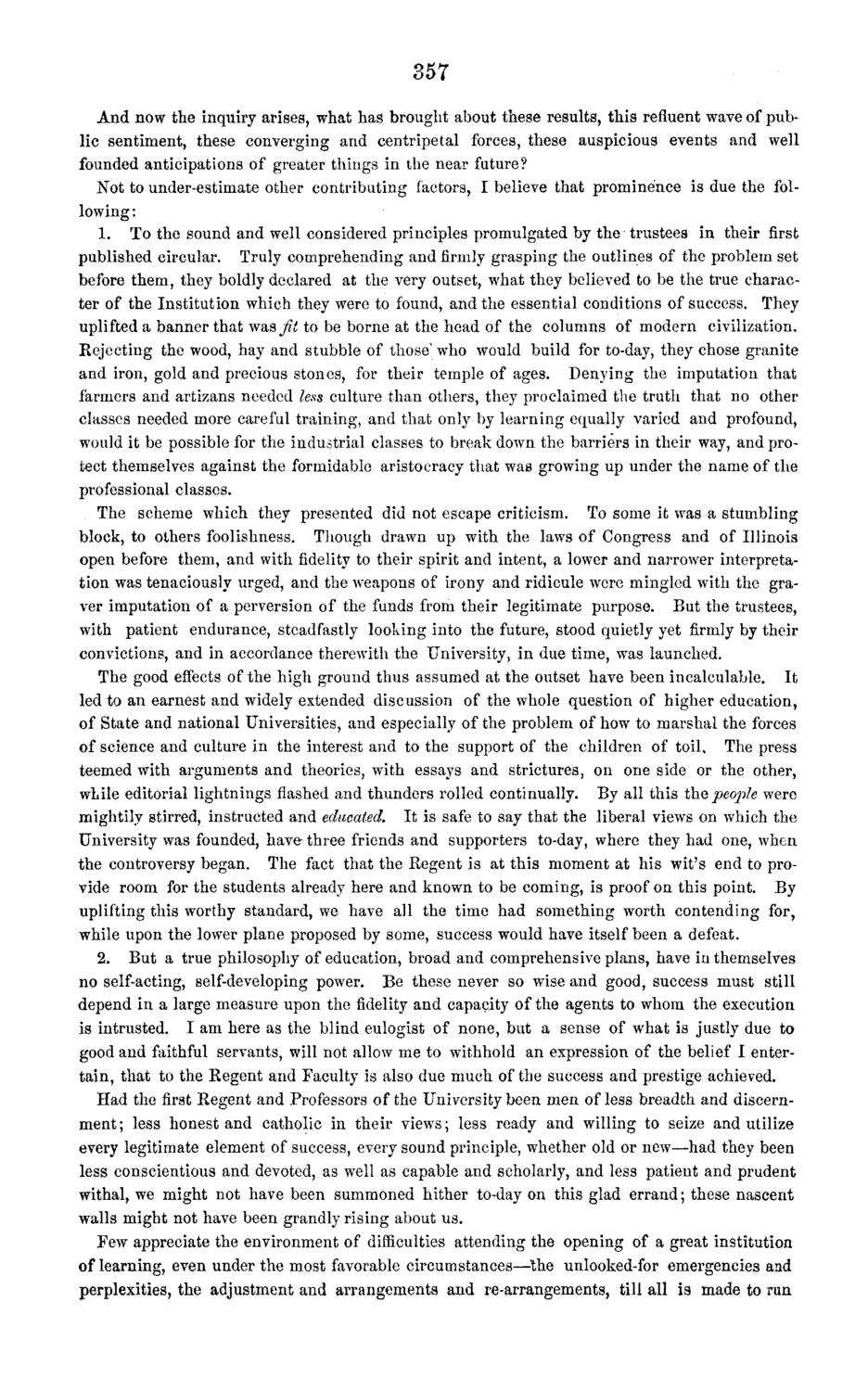| |
| |
Caption: Board of Trustees Minutes - 1871
This is a reduced-resolution page image for fast online browsing.

EXTRACTED TEXT FROM PAGE:
357 And now the inquiry arises, what has brought about these results, this refluent wave of public sentiment, these converging and centripetal forces, these auspicious events and well founded anticipations of greater things in the near future? Not to under-estimate other contributing factors, I believe that prominence is due the following : 1. To the sound and well considered principles promulgated by the trustees in their first published circular. Truly comprehending and firmly grasping the outlines of the problem set before them, they boldly declared at the very outset, what they believed to be the true character of the Institution which they were to found, and the essential conditions of success. They uplifted a banner that w&sjit to be borne at the head of the columns of modern civilization. Rejecting the wood, hay and stubble of those' who would build for to-day, they chose granite and iron, gold and precious stones, for their temple of ages. Denying the imputation that farmers and artizans needed less culture than others, they proclaimed the truth that no other classes needed more careful training, and that only by learning equally varied and profound, would it be possible for the industrial classes to break down the barriers in their way, and protect themselves against the formidable aristocracy that was growing up under the name of the professional classes. The scheme which they presented did not escape criticism. To some it was a stumbling block, to others foolishness. Though drawn up with the laws of Congress and of Illinois open before them, and with fidelity to their spirit and intent, a lower and narrower interpretation was tenaciously urged, and the weapons of irony and ridicule were mingled with the graver imputation of a perversion of the funds from their legitimate purpose. But the trustees, with patient endurance, steadfastly looking into the future, stood quietly yet firmly by their convictions, and in accordance therewith the University, in due time, was launched. The good effects of the high ground thus assumed at the outset have been incalculable. It led to an earnest and widely extended discussion of the whole question of higher education, of State and national Universities, and especially of the problem of how to marshal the forces of science and culture in the interest and to the support of the children of toil. The press teemed with arguments and theories, with essays and strictures, on one side or the other, while editorial lightnings flashed and thunders rolled continually. By all this the people were mightily stirred, instructed and educated. It is safe to say that the liberal views on which the University was founded, have- three friends and supporters to-day, where they had one, when the controversy began. The fact that the Regent is at this moment at his wit's end to provide room for the students already here and known to be coming, is proof on this point. By uplifting this worthy standard, we have all the time had something worth contending for, while upon the lower plane proposed by some, success would have itself been a defeat. 2. But a true philosophy of education, broad and comprehensive plans, have in themselves no self-acting, self-developing power. Be these never so wise and good, success must still depend in a large measure upon the fidelity and capacity of the agents to whom the execution is intrusted. I am here as the blind eulogist of none, but a sense of what is justly due to good and faithful servants, will not allow me to withhold an expression of the belief I entertain, that to the Regent and Faculty is also due much of the success and prestige achieved. Had the first Regent and Professors of the University been men of less breadth and discernment; less honest and catholic in their views; less ready and willing to seize and utilize every legitimate element of success, every sound principle, whether old or new—had they been less conscientious and devoted, as well as capable and scholarly, and less patient and prudent withal, we might not have been summoned hither to-day on this glad errand; these nascent walls might not have been grandly rising about us. Few appreciate the environment of difficulties attending the opening of a great institution of learning, even under the most favorable circumstances—the unlooked-for emergencies and perplexities, the adjustment and arrangements and re-arrangements, till all is made to run
| |